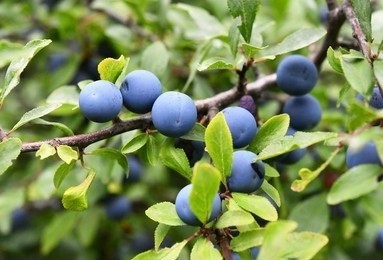Prunus plants belong to the Rosaceae family and are shrubs or trees, woody perennial deciduous fruit trees. After the wild fruit trees were used by people, they gradually began to be initially cultivated artificially and protected, and gradually domesticated into cultivated fruit trees. At present, there are more than 400 cultivated species, including the most common peach, plum, cherry, and apricot.
 Blue fruit growing on a Prunus plant tree
Blue fruit growing on a Prunus plant tree
The Prunus plant is a high-quality species for health, medicine,
gardening, and economic production, and we can use tissue
culture techniques for its detoxification and rapid propagation.
With the economic development and improvement of people's living standards, people pay more and more attention to the nutrition and health effects of food. The fruits of some Prunus plants contain nutrients that are indispensable for human health and have health effects and medicinal functions. Therefore, in many places, Prunus plants are not only edible but also frequently used in gardens.
Prunus plants are characterized by a long generation cycle, high pistil failure rate, high heterozygosity, and susceptibility to virus infection, which makes it difficult to select new varieties by traditional methods, and long-term screening has led to the concentration of cultivars in a few genotypes, and limited germplasm resources have become a constraint to the development of Prunus plant production.
Tissue culture service
Traditional methods always have insurmountable disadvantages, so Lifeasible uses tissue culture technology for Prunus plant germplasm innovation, shortening the breeding cycle and breeding de-virulent seedlings, etc.
Nowadays, we have established a very mature platform in the tissue culture of Prunus plants, and we advise our customers to provide different exosomes depending on the purpose of culture. For example, the regenerated plants obtained by hypocotyl culture have a short culture cycle, are easy to operate, and most importantly, the stability of the explants is better maintained. In contrast, virus-free plants can be rapidly propagated through stem tip culture.
We generally use Prunus plant stem tip and stem segment culture, embryo culture, protoplast culture, and leaf culture for plant regeneration. If you have any questions about this, please consult our staff first.
For our tissue culture of Prunus plants, we mostly use leaves, hypocotyls, stem tips, and stem segments as explants, so MS medium is generally used as the basic medium. However, the factors affecting the efficient regeneration of explants include the genotype of the test material, the type of basic medium, the type and ratio of plant growth regulating substances in the medium, etc. Therefore, we also have our experimental configuration ratio to efficiently carry out the tissue culture projects entrusted by our customers. Of course, we have prepared media such as B5, F14, QL, DKW, WPM, LS, WPM, etc. for different cases.
You want to sign a confidentiality agreement.
You have a specific plant species for your experimental needs.
You have a reliable and relevant cooperation project to discuss.
You are very interested in our project or have any questions.
You need an updated and detailed quotation.
For research or industrial use.

 Blue fruit growing on a Prunus plant tree
Blue fruit growing on a Prunus plant tree
